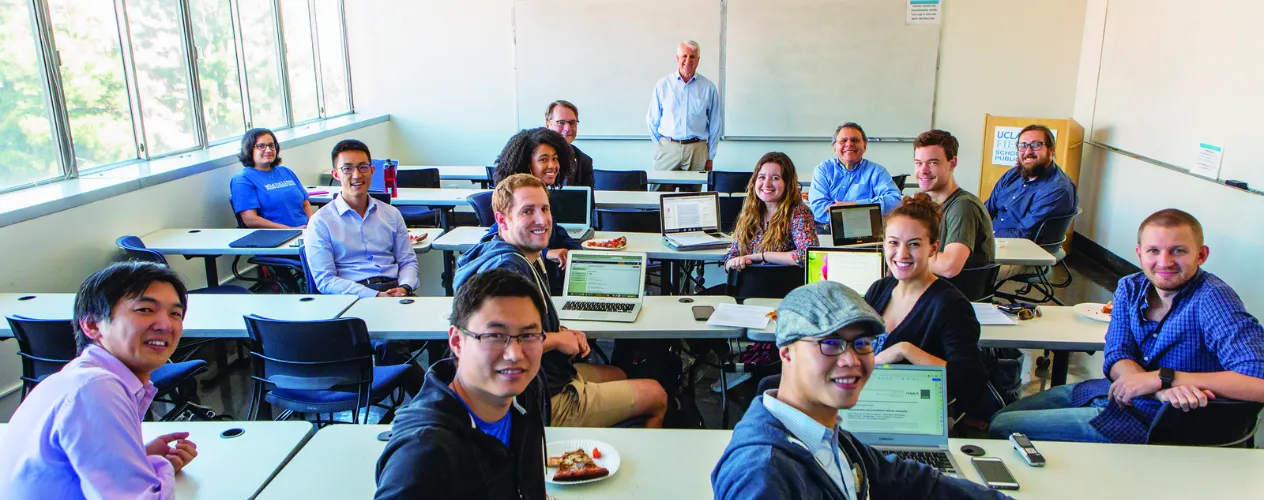Healing the Health System
Through their insights into the social, organization, and economic factors surrounding health care delivery, FSPH-trained researchers contribute to quality, cost-effective and accessible care.

THE U.S. SPENDS MORE THAN $10,000 PER PERSON on health care per year, approximately twice as much as the average spent by comparable high-income countries. There is ample evidence we aren’t getting our money’s worth. The rate of amenable mortality — premature deaths that could have been avoided with effective and timely health care — is higher in the U.S. than in any comparable high-income country, and more than 50 percent higher than in France, Australia, Japan and Sweden.
“We’re spending a huge amount on the provision of medical care and not nearly enough on the social, organizational and economic factors that can lead to better population health in a more cost-effective manner,” says Dr. Thomas Rice, professor in the Fielding School’s Department of Health Policy and Management.
For more than 25 years, the FSPH-based Los Angeles Area Health Services Research Training Program, funded by the federal Agency for Healthcare Research and Quality, has trained doctoral students and postdoctoral fellows who become leaders in evaluating the costs, benefits, outcomes and financing of health care. The program provides two years of funding to five Fielding School PhD students at any one time, and for two new postdoctoral fellows each year who are trained in a collaboration among FSPH; the USC Schaeffer Center for Health Policy and Economics; the Veterans Administration (VA) Greater Los Angeles Center for the Study of Healthcare Innovation, Implementation and Policy; and RAND Health.
Highly trained health services researchers have contributed significantly to recent positive steps in both the quality of U.S. health care and access to it, notes Rice, the program’s director. But major challenges remain. Health outcomes continue to lag behind those of poorer countries that spend far less. Wide health disparities persist, to the detriment of disadvantaged populations. Despite significant gains in access to care since the passage of the Affordable Care Act (ACA) in 2010, the law faces an uncertain future amid legal and political challenges.
The FSPH-based program prepares trainees for these challenges by exposing them to all of the disciplines of public health and beyond — including economics, management, political science and the social determinants of health. The program’s multidisciplinary tint is reflected in the backgrounds of the trainees. Charleen Hsuan (PhD ’16)was a practicing attorney interested in health care ethics — in particular, how the nation decides to distribute limited health resources — when enactment of the ACA inspired her to apply to the program. “I strongly believe that evidence should drive policy decisions,” says Hsuan, now an assistant professor of health policy and administration at Penn State University. “We sometimes assume that the best policy solution to improve access or reduce disparities is to pass a law or enact a new regulation. However, my experience as an attorney suggested that there may be a gap between passing a law and actually seeing a change. My research focuses on this gap — how health laws and policies improve or restrict access to care, and reduce or increase disparities.”
Dr. Maggie Ramirez (MS ’18) was in the process of completing her PhD in industrial and systems engineering at USC when she joined a study involving faculty members at the Fielding School and David Geffen School of Medicine at UCLA. The project was testing a team-based intervention to reduce risk factors for stroke among a mostly Latino population in the county health care system. Ramirez was brought on to help the research team develop and evaluate a mobile application aiming to improve communication among care team members.
“That was my first exposure to the reality that certain groups had higher health risks and worse health outcomes,” Ramirez says. “I decided to see how I could use my engineering training to help eliminate these disparities.” Ramirez completed the two-year postdoctoral fellowship at the Fielding School last summer, and is now an assistant professor at the University of Washington School of Public Health, focusing on the design and implementation of information technology tools to improve the delivery of care to disadvantaged populations.
Through her experience as clinical nursing director and director of education at a community hospital in Los Angeles, Dr. Linda Kim grew concerned about the potential for ineffective communication and collaboration among members of the health care team leading to preventable medical errors, and even deaths. Kim decided to pursue her PhD at the UCLA School of Nursing, focusing on patient safety and quality of care. After completing her doctorate, with her dissertation focusing on how interprofessional communication and collaboration affect patient outcomes and provider satisfaction, she opted to further develop her health services research skills as an FSPH postdoctoral fellow.
We’re spending a huge amount on the provision of medical care and not nearly enough on the factors that can lead to better population health

The FSPH-based Los Angeles area Health Services Research Training Program holds a weekly lunchtime seminar for doctoral students, postdoctoral fellows and faculty.
Kim’s FSPH postdoctoral training was based at the VA, where she found an ideal research setting in the system’s patient-centered medical home (PCMH) model, in which each patient’s overall care is coordinated by an interprofessional health care team, working closely with the patient to deliver comprehensive, patient-centered care. “The essence of PCMH is team-based care, so it aligned perfectly with my research interest,” Kim says. Under the mentorship of senior health services researchers at the VA, Kim completed the postdoctoral program in 2016.
Petra Rasmussen started as an MPH student at Columbia University shortly after the ACA was enacted. “It became an exciting time, because we were seeing policies targeted at improving insurance coverage, as well as a host of delivery reforms,” she recalls. “There was also a strong need for research tracking the impact of these changes.”
After several years as a senior researcher for the Commonwealth Fund, Rasmussen decided to pursue her PhD in health services research. She was drawn to the Fielding School program, she says, both by the quality of the faculty and the prospect of studying the ACA’s impact through the lens of California, which has been on the vanguard of the reforms.
“I had a great job, but wanted to be able to conduct higher-quality research, and getting two years of funding made the decision to go back to school much easier,” says Rasmussen, now in her fourth year of the FSPH doctoral program and embarking on a dissertation that will examine consumer decision-making in health insurance marketplaces. “It’s immensely important to have research that helps to shape health policies and shows how these policies affect the population once they’re implemented. I’m excited to become part of a new generation that will be producing that research.”
